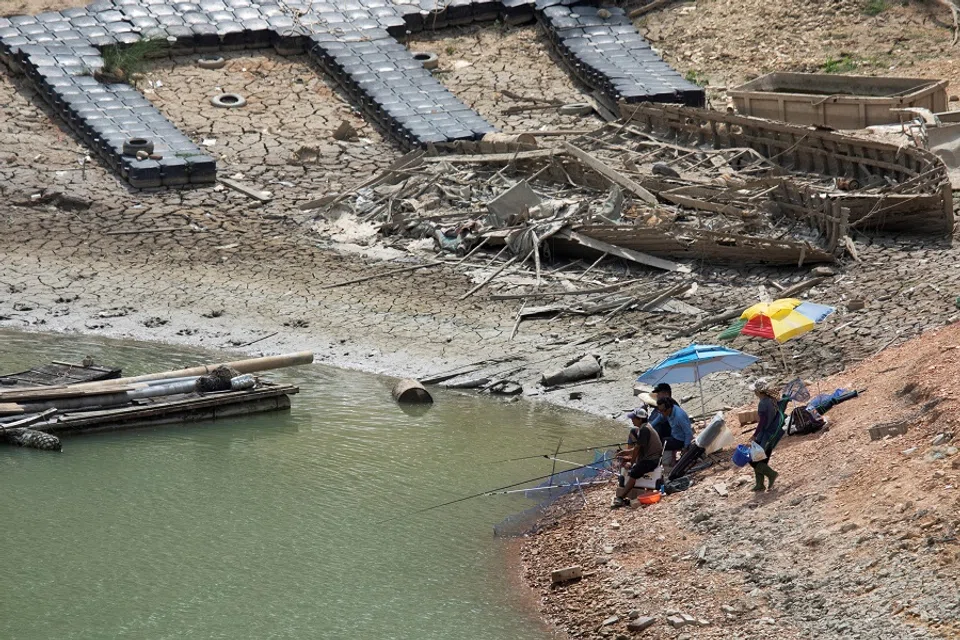Faced with a shortage of water, electricity and vaccines, can Taiwan still deliver the chips?
Water, electricity and Covid-19 vaccines - critical elements to keep Taiwan's leading chip industry going - are in short supply. The situation is currently manageable, say industry watchers, but if this goes on, can Taiwan withstand the pressure and continue delivering the goods to the world?

Taiwan, a powerhouse that supplies more than half of the world's semiconductor chips, is currently facing a shortage of water, electricity, and Covid-19 vaccines. Water levels in its reservoirs have dipped to historic lows amid a surge in demand for electricity as people stay home in the fight against the pandemic. Moreover, Taiwan has secured just 710,000 doses of the Covid-19 vaccine which can inoculate only 3% of its population at one dose per person. How is Taiwan going to ensure that its semiconductor foundries - water and electricity guzzlers that run round the clock - do not grind to a halt?
Triple whammy
Think tanks and academics Zaobao spoke to said that with government support and great effort by the chip manufacturers, measures have been put in place and the challenge is manageable in the short term. However, if the problem persists, Taiwan's competitiveness will take a hit.
Last year, rainfall in Taiwan fell to a historic low in 56 years, resulting in droughts that have an impact on hydropower generation. Although Taiwan experienced a rare bout of heavy rain yesterday afternoon, water levels in various major reservoirs remain low.

Figures from the Water Resources Agency website show that as of 6 pm yesterday, the water storage capacity of Baoshan Reservoir was at 6.9% while that of Baoshan Second Reservoir was at 2.6%. Both of these reservoirs are near Hsinchu Science Park and can only provide enough water to last for ten days and 14 days respectively.
The Central Emergency Operations Center announced on 19 May that if rainfall continues to be insufficient, from 1 June, Hsinchu's "orange alert" of implementing water conservation measures will be raised to the "red alert" of cutting water supply for two days a week.
Low water levels have a significant impact on hydropower generation. Coupled with a sudden increase in demand for electricity as people stay home amid the pandemic, the power supply is expected to be stretched. Additionally, after two major power outages this month and as four major electric generators are undergoing annual repairs at the same time, Taiwan Power Company (Taipower) estimates that the power supply will fall into the danger zone before 28 May. Summer has just arrived in Taiwan. When electricity consumption peaks in July and August at the height of summer, will Taipower be able to ensure a steady supply of electricity?
... if TSMC loses 10% of its production capacity due to power outages, the company's revenue will fall by US$4 billion (S$5.314 billion). The impact on end-market revenues could be magnified by 12 times and hit US$49 billion. - JT Hsu, Boston Consulting Group managing director and partner
Vaccine doses most needed
Of the three factors, what is most worrying is that amid a surge in the number of local Covid-19 cases, Taiwan has only managed to get hold of 710,000 Covid-19 vaccine doses. This means that it only has enough vaccines to inoculate 3% of its 23.5 million population with one dose of the vaccine each. The Taiwanese government claims that in the next two months, it will have access to tens of millions of foreign and local vaccine doses.
On 22 May, global semiconductor manufacturing giant Taiwan Semiconductor Manufacturing Company (TSMC) announced that one of its employees has come down with Covid-19 and is being treated in a hospital. Over ten other employees who were in direct contact with the affected colleague have been placed under home quarantine for 14 days. Notwithstanding the above, TSMC said that the company's operations would not be affected.

Boston Consulting Group (BCG) managing director and partner JT Hsu, who also leads BCG's global work in semiconductors and materials, assesses that if TSMC loses 10% of its production capacity due to power outages, the company's revenue will fall by US$4 billion (S$5.314 billion). The impact on end-market revenues could be magnified by 12 times and hit US$49 billion. If TSMC grinds to a halt, losses incurred could hit US$490 billion.
Taiwan Institute of Economic Research researcher Liu Pei-chen told Zaobao that Taiwan accounts for 55% of the global semiconductor foundry market and 92% of all semiconductor production at process nodes less than 10nm, which are the most advanced chips. Taiwan supplies various high-end chips used in mobile phones, computers, and cars.
Ample measures but will they hold up?
Liu said, "No matter how bad the pandemic gets, the government will strive to keep the assembly lines of the semiconductor industry running and ensure that R&D does not stop. Manufacturers have also assured their customers that they have implemented split-team work arrangements so that factory operations will continue."
Institute for Information Industry senior industry consultant and senior director John Chen told Zaobao that the government and manufacturers have already proposed concrete measures to deal with the three key shortages.

Taking TSMC as an example, Chen said that the company has already built a water treatment plant in Nanke that is slated to be ready by the end of this year. Once in operation, it will treat industrial wastewater and sewage and supply 20,000 tonnes of water to the company on a daily basis, accounting for 90% of its water needs. The remaining water will be supplied by water trucks.
TSMC is also planning to build a water treatment plant in its Baoshan, Hsinchu facility which will provide 30,000 tonnes of recycled water per day. Various other semiconductor foundries in the northern, central, and southern regions of Taiwan including United Microelectronics Corporation, have also begun purchasing water trucks.
As for keeping production lines running amid power shortages and the worsening Covid-19 situation, Chen said, "The Ministry of Economic Affairs expressed last week that major companies such as Taipower and TSMC work well together and are moving towards using self-powered devices during peak periods to maintain production capacity and to reduce the burden on the power system. This shows that both parties have already built rapport with each other; during off-peak hours, Taipower supplies a stable amount of electricity to science and tech giants. Economic Minister Wang Mei-hua also said that even if the alert level is raised to "four", all assembly lines of industries related to the international supply chain and urgently needed industries will not be halted."
This includes improving the overall water storage management system, reducing emissions from coal-powered plants and the impact it has on cumulonimbus clouds, and rethinking the use of natural gas and nuclear power to support multiple power supplies. - Chen Yixin, Honorary Professor, Department of Diplomacy and International Relations, Tamkang University

However, Honorary Professor Chen Yixin of Tamkang University's Department of Diplomacy and International Relations told Zaobao that the three challenges need to be tackled at their root if Taiwan's competitiveness is to be maintained in the semiconductor and other industries. This includes improving the overall water storage management system, reducing emissions from coal-powered plants and the impact it has on cumulonimbus clouds, and rethinking the use of natural gas and nuclear power to support multiple power supplies.
Prof Chen said, "You cannot expect a hungry horse to run far. If the semiconductor industry lacks water and power for a long time, Taiwan's competitiveness will be weakened."
As for the shortage in vaccines, he thinks that Taiwan needs to make diplomatic efforts to help the US understand that Taiwan must have sufficient vaccines before the global chip shortage can be alleviated.





![[Photos] Fact versus fiction: The portrayal of WWII anti-Japanese martyrs in Taiwan](https://cassette.sphdigital.com.sg/image/thinkchina/3494f8bd481870f7c65b881fd21a3fd733f573f23232376e39c532a2c7593cbc)